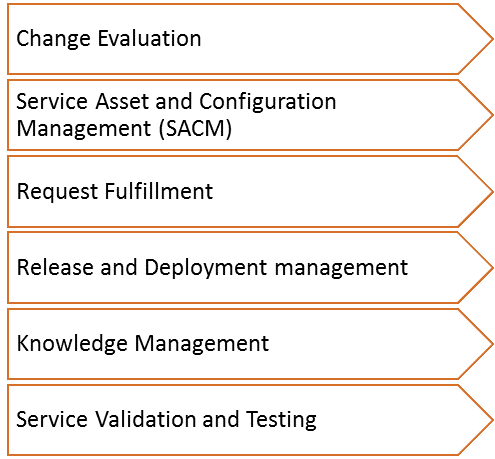Course Content
Release, Control and Validation
- Terms and Definitions
- Overview of Release, Control and Validation
- Process and functions of Release, Control and Validation
- Scope and Objective of RCV
- Service Transition about RCV Processes
- Service Transition value to business
- Interaction of RCV processes with various stage of lifecycle
- Develop Service Transition Strategy
- Key initiatives to prepare effective service transition
- Plan and coordinate service transition activities
- Service Transition Process support
Service Asset and Configuration Management
- Definitions
- Scope and objective
- Business value
- Key concepts and principles
- Methods and techniques
- Information Management in Service Asset and Configuration Management (SACM)
- CSFs and KPIs
- Risks and challenges involved in the process
- SACM activities performed by Service Operation
- Roles and Responsibilities
Change Management
- Define Change Management
- Scope and Objective
- Business value
- Basic concepts and terminologies
- Input, output and triggers
- Interfaces of process
- Role of the Configuration Management System
- CSFs and KPIs
- Operational activities
- Manage and control organisational stakeholder changes
- Risks and Challenges
- Roles and Responsibilities
Change Evaluation
- Define Change evaluation
- Scope and objective
- Business value
- Principles and Policies
- Key concepts and terminologies
- Methods and Techniques
- Evaluation Report Contents
- Input, output and trigger
- Interfaces with other processes
- Information Management in Change Evaluation
- CSFs and KPIs
- Risks and Challenges involved in the process
- Roles and Responsibilities
Release and Deploy Management
- Definitions
- Scope and objective
- Release and Deployment Management Process
- Business Value
- Methods and Techniques
- Input, output and triggers
- Interfaces with other processes
- Managing information in the process of Release and Deployment Management
- CSFs and KPIs
- Risks and Challenges
- Roles and Responsibilities
Service Validation and Testing
- Definitions
- Scope and objective
- Business value
- Key concepts and principles
- Input, output and triggers
- Interfaces with other processes
- Information Management in Service Validation and Testing
- CSFs and KPIs
- Risks and Challenges
- Roles and Responsibilities
Request Fulfilment
- Define Request Fulfilment
- Scope and objectives
- Business value
- Basic concepts and terminologies
- Methods and Techniques
- Input, output and triggers
- Process interfaces
- Information management in Request Fulfilment
- CSFs and KPIs
- Risks and Challenges
- Roles and Responsibilities
Knowledge Management
- Definitions
- Scope and objective
- Business value
- Basic Concepts and Principles
- Methods and Techniques
- Input, output and triggers
- Interfaces with other processes
- Information Management in the Knowledge Management process
- CSFs and KPIs
- Risks and Challenges
- Relationship between the Knowledge Management Process and CSI
- Roles and Responsibilities
Technology and Implementation Considerations
- Definitions
- Technology requirements for supporting process capabilities
- Management of change in the operations
- Assess and manage risks in Service Operation
- Operational Staff in Service Design and Transition
- Knowledge Management tools
- Collaboration
- Configuration Management System
- Plan the implementation of Service Management tools
- Implement considerations

 ENQUIRE
ENQUIRE
 REQUEST CALLBACK
REQUEST CALLBACK
 GET A FREE QUOTE
GET A FREE QUOTE


 Introduction
Introduction Course Details
Course Details Course Content
Course Content






 London
London